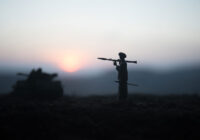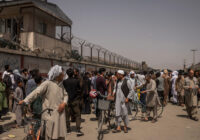In this guest edition of The Interview, Vishal Manve talks to Biraj Patnaik, Amnesty International’s regional director for South Asia.
Under the Trump administration, the focus on South and East Asia has increased significantly. From threatening North Korea and meeting Chinese President Xi Jinping to dropping a “MOAB” on Islamic State militants in Afghanistan, the US presence in Asia has gained prominence since the inauguration of President Donald Trump.
But Asia is mired in its a refugee crisis as hundreds of thousands of Rohingya Muslims flee persecution in Myanmar, writers and bloggers face death threats and attacks in Bangladesh, and Kashmir’s azadi (freedom) movement gains momentum in India for human rights abuses committed by armed forces.
In this guest edition of The Interview, Vishal Manve talks to Biraj Patnaik, Amnesty International’s new South Asia director and a prominent campaigner with more than two decades of experience in the region. Manve speaks to Patnaik about Myanmar’s Rohingya refugee crisis, the state of human rights violations in India, and the Kashmiri independence movement that has put India-Pakistan relations on a collision course.
Vishal Manve: What are the challenges facing South Asia today? How is the state of human rights enforcement and its abuse in the region?
Biraj Patnaik: Across South Asia, people’s rights are under assault. Crude colonial-era laws are being used as instruments to silence people offline, while new cybercrime laws are being used to curb online expression. Journalists, bloggers and activists are being harassed, intimidated, threatened and even subjected to violence or killed. Governments excuse their actions by invoking national pride, smearing people who disagree with them or criticizing them with accusations of sedition, treason or blasphemy.
In countries afflicted by conflict, impunity still reigns. As Nepal and Sri Lanka try to emerge from under the shadow of long-running conflicts there, the victims still seek justice. There are victims of torture, of enforced disappearances, of unlawful killings, who have been made promises by governments who have yet to deliver.
In Afghanistan, the war is widening, not winding down. There are more people internally displaced than ever before. The number of civilian casualties is higher now than at any point since records began being compiled. Not since 2001 has the Taliban controlled more territory. 2016 marked the highest year for civilian casualties recorded in a single year, with 11,418 people either killed or wounded. Last year was also a record year for child casualties — with 3,512 children killed, a 24% increase on the highest figure previously recorded for child casualties.
And yet, for some, it has become a forgotten conflict, with donors cutting back on their commitments and shutting their doors to refugees.
Manve: What are your key objectives for the region? What issues specific to India, Sri Lanka, Bangladesh, Pakistan and Afghanistan will you be focusing on?
Patnaik: Our job is to help people fight for their rights whenever they are threatened or denied. Our work isn’t limited to a few issues. We work on the rights of migrants and refugees; violence against women; the victims of torture or enforced disappearances; people denied their rights to housing, water or sanitation; and people punished for peacefully exercising their rights. We don’t impose an agenda on the region but are here to respond to and amplify calls for justice.
Manve: From the attack on bloggers by machete-wielding fundamentalists to journalists facing attacks, the region has grown hostile in the past few years. Any assessment on this? How can governments and civil society counter this?
Patnaik: Rarely has it been more dangerous to be a journalist or blogger in South Asia. People are threatened with imprisonment, violence or worse for peacefully exercising their rights. Sometimes it is governments who are responsible. Sometimes it is non-state actors. And sometimes it is hard to tell which. The sign of a strong government isn’t how many critics it silences, but the effort it makes to protect people peacefully exercising their rights, however much it may dislike what they have to say.
Manve: What is the state of refugee rights in South Asia? In a recent piece, you spoke about the policy of non-refoulement and how South Asian nations are violating it. What are the long-term implications of this for the region?
Patnaik: South Asia has a proud tradition of supporting refugees. From the time many of the region’s countries gained independence, they have been homes to people fleeing conflict. Until recently, Pakistan was home to the largest population of Afghan refugees in the world and continues to host 1.3 million registered refugees.
But over the past couple of years, Pakistani authorities have subjected Afghan refugees to relentless coercion, forcing them to return to a country they haven’t known for decades, against the backdrop of a new conflict as dangerous as the one they first fled. They have become hostages to disputes between the Afghan and Pakistani governments. More than 370,000 registered Afghan refugees were made to return home from Pakistan in 2016 — a 12-year high — compared to just under 60,000 the year before. The UNHCR [United Nations High Commissioner for Refugees] is complicit in this through its “voluntary repatriation” program, which Pakistan is using to force refugees back into Afghanistan.
Manve: Which human rights abuses are rampant in India and Pakistan with respect to Kashmir? What course of action do you suggest to bring down these escalations that suppress individual human rights?
Patnaik: Both the Indian and Pakistani governments have obligations under international law to uphold and protect the rights of all people who live on their territory. Amnesty has continuously been following all Kashmir-related developments closely, and has been raising human rights concerns through extensive media work and advocacy with political leaders from Kashmir, India’s central government and the Pakistani government.
We support the UN High Commissioner for Human Rights’ request to India and Pakistan for unfettered access to both sides of Kashmir for an independent human rights assessment. We remain committed to our campaigns for accountability for past human rights abuses, including impunity for violations by armed forces. Amnesty International believes that human rights accountability, transparency and justice for past violations, and respect for human rights are important to achieve peace and stability.
Manve: In Afghanistan, refugee camps are overcrowded, with lack of access to food, water, sanitation and security, and the growing presence of the Taliban. What do you think the Afghan government can do, and how must the international community be involved in rebuilding Afghanistan?
Patnaik: The threat to the security of Afghanistan doesn’t just come from armed groups. It comes also from denying millions of people — who have been forced to flee conflict — their rights to food, water, sanitation and security. As the international community turns its back on a 15-year-long war, it is abandoning these people to as precarious a fate as they have known. Withdrawing troops should not mean a withdrawal of aid.
By the end of 2016, the total number of internally displaced people [IDP] in Afghanistan reached 1.4 million and, in 2016 alone, more than 600,000 Afghans fled their homes due to conflict. As the security situation is deteriorating, most of the attention and resources of the Afghan government and the international community are spent on counterinsurgency and maintaining security, and issues of displaced population or social welfare fall to the bottom of the agenda of both the Afghan government and the international community.
 The international community bears a responsibility for the welfare of the Afghan people — one that it cannot quit when it becomes politically expedient to do so.
The international community bears a responsibility for the welfare of the Afghan people — one that it cannot quit when it becomes politically expedient to do so.
Manve: What problems does India face when it comes to civil society liberties, human rights and access to the judiciary at a time when there is the constant blocking of nongovernmental organizations — ones that highlight human rights abuses?
Patnaik: Successive Indian governments have continued to use the Foreign Contribution (Regulation) Act [FCRA] — which restricts civil society organizations from receiving foreign funding — to harass NGOs. It is a law that contravenes India’s international human rights obligations and impinges on the freedom of expression and freedom of association of civil society organizations and human rights defenders.
In June 2016, the UN Special Rapporteurs on Freedom of Expression, Freedom of Association and Human Rights Defenders called on the Indian government to repeal the FCRA, which they said was “being used more and more to silence organisations involved in advocating civil, political, economic, social, environmental or cultural priorities, which may differ from those backed by the Government.”
The law’s use of broad and vague terms, such as “political activity” and “national interest,” have left it open to abuse. In cases where organizations challenged the suspension of their FCRA, the courts have generally ruled in their favor. The courts have also repeatedly reminded the government that, in a democracy, dissent should not be muzzled. Yet more than 20,000 organizations now find themselves unable to access foreign funding, since their FCRA accounts have either been canceled or not renewed.
The views expressed in this article are the author’s own and do not necessarily reflect Fair Observer’s editorial policy.
Photo Credit: DVIDSHUB
Support Fair Observer
We rely on your support for our independence, diversity and quality.
For more than 10 years, Fair Observer has been free, fair and independent. No billionaire owns us, no advertisers control us. We are a reader-supported nonprofit. Unlike many other publications, we keep our content free for readers regardless of where they live or whether they can afford to pay. We have no paywalls and no ads.
In the post-truth era of fake news, echo chambers and filter bubbles, we publish a plurality of perspectives from around the world. Anyone can publish with us, but everyone goes through a rigorous editorial process. So, you get fact-checked, well-reasoned content instead of noise.
We publish 2,500+ voices from 90+ countries. We also conduct education and training programs
on subjects ranging from digital media and journalism to writing and critical thinking. This
doesn’t come cheap. Servers, editors, trainers and web developers cost
money.
Please consider supporting us on a regular basis as a recurring donor or a
sustaining member.
Will you support FO’s journalism?
We rely on your support for our independence, diversity and quality.






